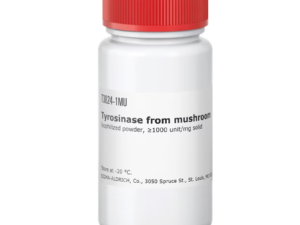Description
Phytase: Unlocking the Potential of Plant-Based Diets for Humans and Animals
Phytase is an enzyme that has garnered significant attention in recent years, particularly in the fields of animal nutrition and human health. This naturally occurring enzyme plays a crucial role in breaking down phytate (also known as phytic acid), a compound found abundantly in plant-based foods. Understanding phytase and its functions is essential for optimizing nutrient absorption and improving the overall nutritional value of plant-based diets.
What is Phytate and Why is it a Problem?
Phytate acts as the primary storage form of phosphorus in plant seeds, grains, and legumes. While phosphorus is vital for various biological processes in both plants and animals, phytate in its intact form can be problematic. It has a strong negative charge that allows it to bind strongly to positively charged minerals like calcium, iron, zinc, and magnesium. This binding action inhibits the absorption of these essential minerals in the digestive tract, leading to potential nutrient deficiencies.
This is particularly concerning for:
- Animals: Livestock and poultry fed primarily plant-based diets often suffer from mineral deficiencies due to the phytate content of their feed. This can impact growth, bone development, and overall health.
- Humans: Individuals relying heavily on plant-based diets, especially in regions where mineral deficiencies are prevalent, are also susceptible to reduced mineral absorption due to phytate.
Phytase: The Solution to Phytate’s Binding Problem
Phytase enzymes catalyze the hydrolysis (breakdown) of phytate, releasing the bound phosphorus and minerals, making them more bioavailable for absorption. By cleaving the phosphate groups from the phytate molecule, phytase essentially unlocks the trapped nutrients and prevents them from being excreted.
Benefits of Phytase Supplementation:
The benefits of incorporating phytase into diets are numerous and span both animal and human health:
- Improved Mineral Absorption: Increased bioavailability of essential minerals like calcium, iron, zinc, and magnesium.
- Enhanced Phosphorus Utilization: Reduces the need for inorganic phosphorus supplementation in animal feed, contributing to more sustainable agricultural practices.
- Reduced Environmental Impact: Lower excretion of phosphorus in animal manure, minimizing the risk of water pollution and eutrophication (excessive nutrient enrichment) in aquatic ecosystems.
- Improved Animal Growth Performance: Enhanced nutrient absorption leads to better growth rates, feed efficiency, and overall health in livestock and poultry.
- Potential Benefits for Human Health: Studies suggest that phytase supplementation may improve mineral status in humans, particularly in populations with high phytate intakes.
- Enhanced Bone Strength: Increased calcium absorption can contribute to stronger bones and reduced risk of osteoporosis.
Phytase in Animal Nutrition:
The use of phytase in animal feed is perhaps its most well-established application. Supplementing animal diets, especially for poultry and swine, with commercially produced phytase enzymes has become a common practice. This strategy allows farmers to:
- Reduce the need for expensive inorganic phosphorus supplements.
- Improve animal growth and productivity.
- Minimize the environmental impact of animal agriculture.
Phytase in Human Nutrition:
While less prevalent, the application of phytase in human nutrition is gaining traction. Strategies include:
- Dietary Modification: Preparing foods in ways that naturally activate phytase within the food itself (e.g., soaking, sprouting, and fermentation of grains and legumes).
- Enzyme Supplementation: Including phytase enzymes in food products or as dietary supplements.
- Development of Phytase-Rich Food Varieties: Breeding or genetically modifying crops to express higher levels of endogenous phytase.
Future Directions and Challenges:
Research continues to explore the full potential of phytase in both animal and human nutrition. Key areas of focus include:
- Developing more efficient and thermostable phytases: Enzymes that can withstand the high temperatures used in feed processing and food preparation.
- Understanding the complex interactions between phytate, phytase, and other dietary components: Optimizing phytase supplementation strategies for maximum benefit.
- Exploring the potential of phytase for treating mineral deficiencies in humans: Conducting well-designed clinical trials to assess the efficacy of phytase supplementation in different populations.
- Developing cost-effective and sustainable phytase production methods: Making phytase more accessible to both large-scale agriculture and individual consumers.
Conclusion:
Phytase enzymes hold immense potential for improving the nutritional value of plant-based diets and addressing mineral deficiencies in both animals and humans. By effectively breaking down phytate and unlocking its trapped nutrients, phytase contributes to improved health, sustainable agricultural practices, and a more efficient utilization of valuable resources. As research continues to unveil its full potential, phytase is poised to play an increasingly important role in ensuring food security and promoting optimal nutrition for all.











Reviews
There are no reviews yet.